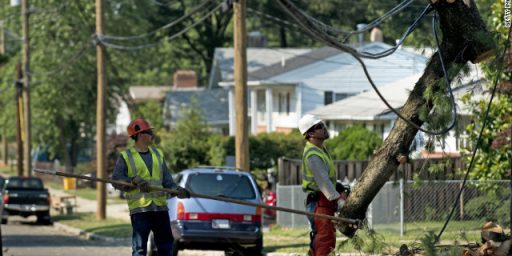Twitter Study Misunderstands Twitter
A new study says Twitter doesn't break news faster than the wires. But nobody claims it does.
A new study says Twitter doesn’t break news faster than the wires. But nobody claims it does.
PressGazette (“Twitter not quicker than newswires on breaking news say researchers after studying 51 million tweets“):
Twitter is not set to replace traditional newswires as a source for breaking news, researchers have found.
Academics from the University of Edinburgh and University of Glasgow examined 27 high-profile news events in 2011, researchers discovered that newswires broke the news first 15 times, with Twitter leading eight times and a further four events covered almost simultaneously.
For some events, such as the capture of Tripoli by Syrian rebels and the arrest of Serbian war criminal Goran Hadzic, the first mentions on Twitter occurred more than 15 minutes after newswires broke the news.
The analysis of 51 million tweets further found that Twitter was better for breaking off-diary news, such as natural disasters or “hyper-local” news.
It was quicker off the mark than newswires in its reporting of a car bomb explosion in Oslo and the start of the London riots.
But the study concluded that “while Twitter can break news before newswires in limited cases, for major events there is little evidence that it can replace newswire providers”.
Um, it’s not supposed to. The study has somehow managed to operationalize the wrong question.
What people who rely on Twitter for breaking news claim is not that the social platform is in the business of breaking stories but rather that it’s the best place to get the breaking stories you’re interested in fast. That’s an important distinction.
Twitter isn’t magic. If you just open the Twitter.com page and stare at it, you’ll find it incredibly useless. What the service enables you to do, however, is to follow people who have useful insights into the issues you care about. In addition to over 500 people on my Foreign Policy list, I follow 90 Sports sources, and 40 who tweet on Technology issues. Having carefully crafted lists of such people over the years, I’ve essentially created my own news wire service, which pushes me stories about things I care about. That beats hanging out on the AP website and hitting refresh.
But Twitter isn’t in some sort of competition with the AP or Reuters or APF. Indeed, I follow all of those services plus many other wires and mainstream journalistic outlets. Furthermore, I follow dozens of beat reporters and other journalists who cover the issues I care about. And the vast majority of the links that get pushed to me send me to stories produced by said wire services, newspapers, and magazines.







Excellent post James.
The other aspect that this study appears to miss is that Twitter is an aggregation and amplification platform. So while it isn’t primarily about *breaking news*, Twitter is one of the most powerful platforms out there for *quickly spreading* news.
This is also the double edged sword of Twitter, as the platform has also demonstrated itself to be extremely effective at spreading false news.
Readers Digest reported a few months ago about a government grant of $200, 000 that went to a college to study the effects of Twitter.
Your tax dollars at work!!
I am just glad to hear somebody found a use for the thing. I hate to admit that if they would have come to me for VC funding of Twitter I would have laughed them out of the office – after all, do I really need hourly updates on Weird Al’s nail clipping habits?
The bigger, business problem for me is that Twitter feels like a “feature” of another service, rather than a service in itself – oh, and I cannot imagine a reliable and unconstrained revenue model that keeps it going in the long term.
Maybe acquisition is the plan, or licensing/integration with other services. I dunno….
Then some of those special links end up here for all to enjoy. And that’s how a Tweet becomes a Post!
@Tillman: Occasionally, yes. Although I find the opposite happens far more often. That is, things that once upon a time would have found there way here as a Quick Take post wind up being tweets and not posted. I’m not sure whether that’s a good or bad thing.
Add @NeckbeardHacker to tech 😉